Studying America’s Eugenics Era through an ELSI Lens: Data, Context, and Relevance
We present innovative interdisciplinary research on the history of eugenic sterilization in the 20th century US, with the objective of showcasing new approaches in methodology and dissemination, and connecting past examples of genetic stigmatization to contemporary bioethical questions. The presenters are part of the ELSI-funded research team that is building and analyzing datasets on eugenic sterilization in California, Iowa, North Carolina and Michigan. Our aggregate dataset includes nearly 35,000 cases–more than ½ of the national total–and reveals powerful patterns related to age, gender, race, disability, and diagnosis that illustrate how eugenic biases of defectiveness and abnormality played out on micro- and macro-levels.
Our presenters will discuss: (1) The history of state eugenic sterilization laws and our motivations for undertaking a multi-method investigation of this topic (2) our study design and analytic findings, including patterns in implementation of forced sterilization across population groups, across states, and over time, and (3) use of big data analytics to examine how social biases shaped patterns of sterilization performed under state eugenics laws. Lastly, (4) we will discuss digital humanities and data visualization as a strategy to disseminate findings to broader audiences including K-12. Our study offers new scholarly knowledge about the ways in which a particular variant of genetic determinism resulted in the widespread state-mandated deprivation of reproductive capacity. This work can serve as a backdrop for contemporary conversations about the extent to which conceptions of normality, disability, and genetic stigmatization can define norms and practices of disease prevention and human improvement.
Panelists: Natalie Lira, PhD; Nicole Novak, PhD, MSc; Elyse Thulin, MS; Alexandra Minna Stern, PhD
Videos in Series
-
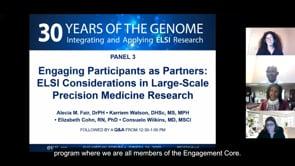
2020 ELSI Virtual Forum - Engaging Participants as Partners: ELSI Considerations in Large-Scale Precision Medicine Research
-
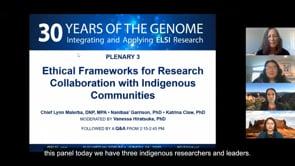
2020 ELSI Virtual Forum - Ethical Frameworks for Research Collaboration with Indigenous Communities
-
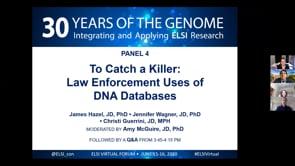
2020 ELSI Virtual Forum - To Catch a Killer: Law Enforcement Uses of DNA Databases
-
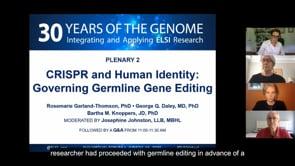
2020 ELSI Virtual Forum - CRISPR and Human Identity: Governing Germline Gene Editing
-
2020 ELSI Virtual Forum - Welcome and Opening Remarks
-
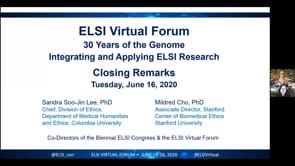
2020 ELSI Virtual Forum - Closing Remarks
-
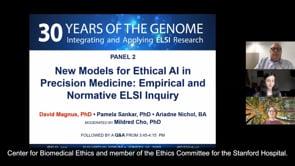
2020 ELSI Virtual Forum - New Models for Ethical AI in Precision Medicine: Empirical and Normative ELSI Inquiry
-
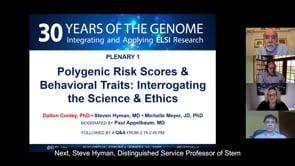
2020 ELSI Virtual Forum - Polygenic Risk Scores & Behavioral Traits: Interrogating the Science & Ethics
-
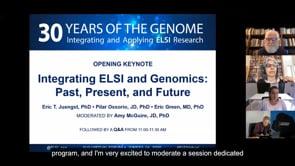
2020 ELSI Virtual Forum - Integrating ELSI and Genomics: Past, Present and Future (Keynote)
